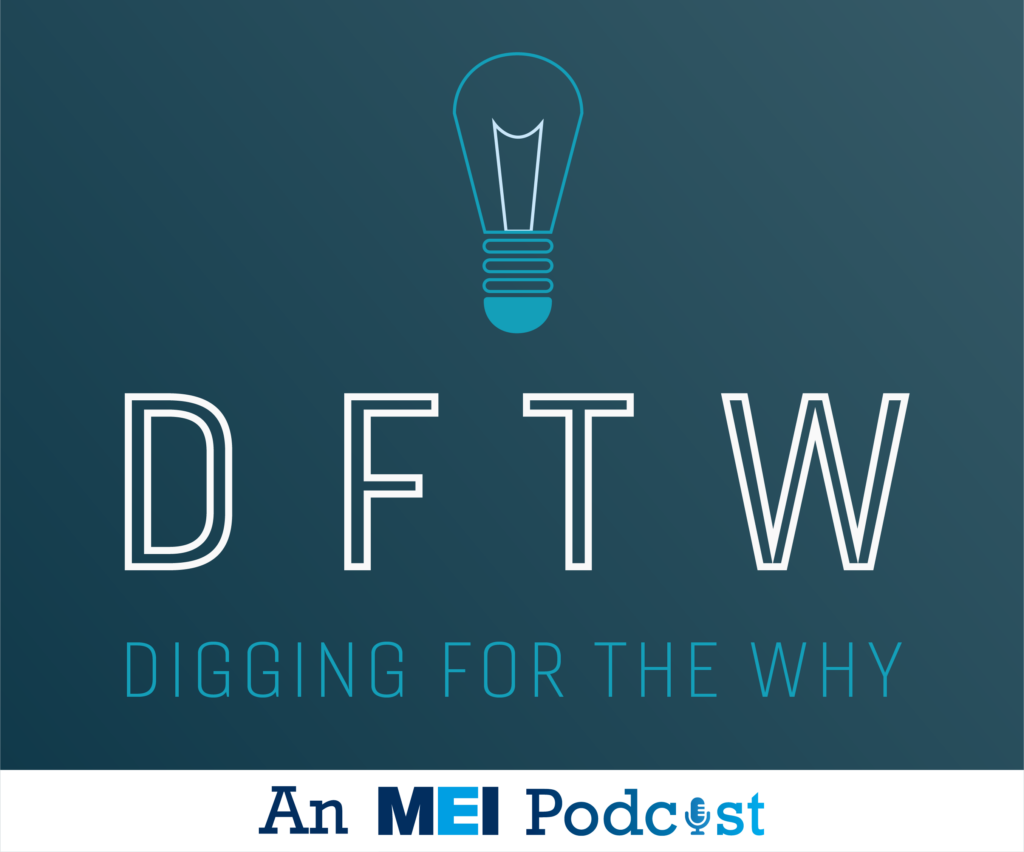In this series of posts, we’ll be featuring mathematical podcasts from all over the internet, by speaking to the creators of the podcast and asking them about what they do.
We spoke to Andy Lumley, Head of Learning Technology for educational charity MEI, about their podcast Digging For The Why.
Podcast title: Digging For The Why
Website: https://mei.org.uk/digging-for-the-why-a-new-mei-podcast-for-key-stage-2-3-teachers/
Links: Apple Podcasts, Spotify, Google Podcasts, Amazon Music, Stitcher, Buzzsprout
Average episode length: 45 minutes
Recommended episode: Episode 7 with Richard Perring has some real nuggets in there!

What is your podcast about, and how did it start?
DFTW started out as a classroom mantra whilst I (Andy, right) was still teaching. I always strived to encourage my students to ask why and I always asked them why to really try and gauge understanding. When I joined MEI and met Alison, we shared so many similar thoughts and traits that we decided to start a podcast around the idea, and importance, of asking why. DFTW is essentially that – digging for the why. We talk to people from the maths community (teachers, lecturers, authors) about why we should dig for the why to encourage better conversations, better learning, and better understanding. Season 1 focused on the transition from primary to secondary but season 2 (out soon!) goes much broader but still focuses on the benefits of asking why.
Who publishes your podcast? Tell us about your organisation.
MEI (Mathematics in Education and Industry) is a national maths charity with the goal of improving maths education for all. DFTW is our first podcast and could, hopefully, lead to more down the line. I (Andy Lumley) am the Head of Learning Technology for MEI (in charge of Integral alongside other projects) and Alison Hopper (left) is a Maths Education Support Specialist for primary maths.
Who is the intended audience for the podcast?
Season 1 is aimed at anybody teaching years 5-8, primarily, but we think anybody involved in teaching maths at any level can find useful things in every episode. Season 2 is for anybody involved in maths education!
What is a typical episode like?
DFTW follows a simple format – Alison and I discuss a given topic (e.g. Mastery in the classroom) and try to have a guest on each episode to bring their expertise to the show. Episodes tend to be 30-45 minutes long (some go a bit longer when there is just too much to talk about!) as we tried to make it a commute length listen. Season 1 was released weekly in the spring/summer of 2022, and season 2 will be released weekly in the new academic year 2023/24.
Why should people listen? Why is it different to other mathematical podcasts?
As with all maths teachers, ideas and thoughts differ. It is always valuable to listen to fellow educationalists discuss topics and themes even if it is something you feel really good about as you never know what might stick with you.
What are some highlights of the podcast so far?
The real highlight for me (Andy) personally has been learning so much about the primary sector of teaching maths. The arrogant secondary teacher in me wants to travel back in time and really ensure that NQT Andy gives real value to the 11-year mathematical journey his students have already been on. There is so much talk about Mastery in the maths classroom at the moment so to hear from Steph Kirk in Episode 2 about how she is able to influence the teaching in her school as it only had year 7s at the time was really insightful.
What exciting plans do you have for the future?
Season 2 features a wider range of guests from the ever-amazing Ben Sparks through to world renowned author Alex Bellos so we can’t wait to get them out there later in 2023. Beyond that, we plan to expand further and try to take DFTW international with our guests and see what the rest of the world thinks about the need to dig for the why!

